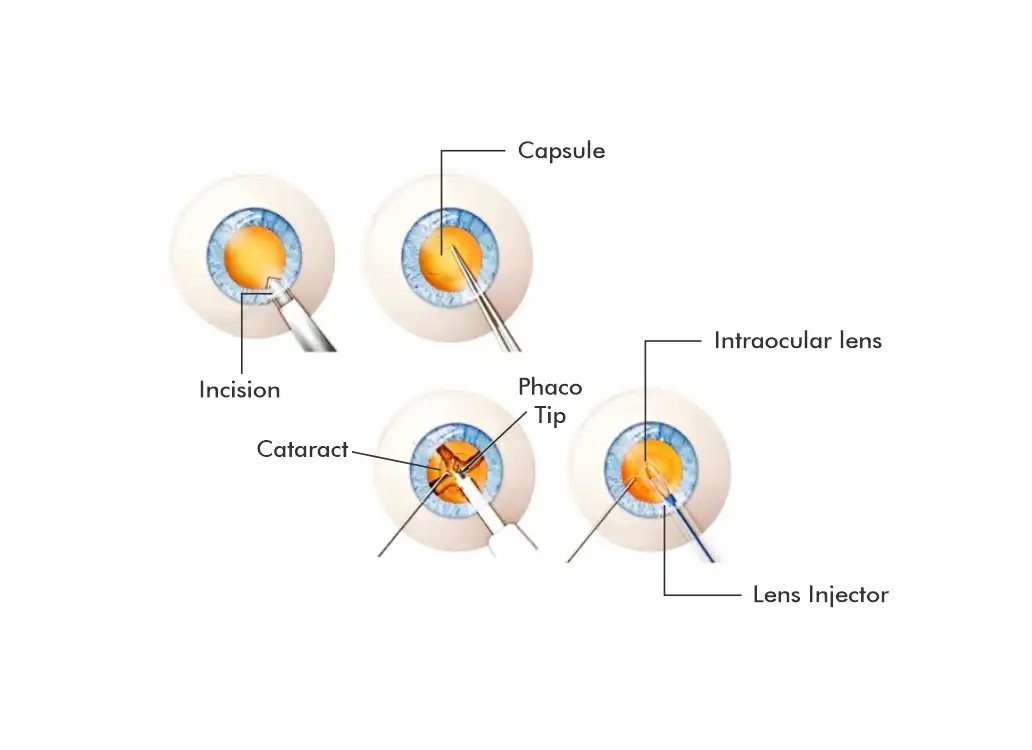
 Posted By Akio
Posted By Akio- Comments 0
Cataract is an eye condition that predominantly occurs with age but at times it can also be present at birth or later occur due to other medical conditions. The surgery for cataracts is one of the most common procedures that is performed widely to restore clarity of vision to millions of people.
Surgeries can be really overwhelming sometimes, but when you are in the hands of the best eye specialists in Delhi your worries nullify. From a basic understanding of the condition to the whole procedure and the pre and post-care, our doctors at AK Institute of Ophthalmology, devote themselves to take complete care of you.
What is A Cataract Surgery
Cataract surgery is a common procedure to treat cataracts, which cause the eye’s natural lens to become cloudy, affecting vision. During the surgery, the clouded lens is removed and replaced with an artificial intraocular lens (IOL). The procedure is usually quick, performed under local anesthesia, and typically takes 15-30 minutes.
Most patients experience improved vision within days. Cataract surgery is considered safe and effective, helping restore clarity and quality of life. Recovery is usually fast, with patients returning to normal activities within a few weeks.

Treatment Options
Phacoemulsification (Phaco): The most common method, where ultrasonic waves break up the cataract before it’s removed, followed by the implantation of an intraocular lens (IOL).
Laser-Assisted Cataract Surgery: Advanced laser technology is used to enhance precision, reducing risks and recovery time.
Premium IOLs: Offering options like multifocal and toric lenses, ensuring better vision post-surgery without the need for glasses.
Traditional Cataract Surgery: Painless, stichless, manual extraction of the cataract and lens replacement, ideal for certain cases.
Preparation Before Your Cataract Surgery
Consult a trusted eye specialist
Consulting with a trusted eye specialist is essential when preparing for cataract surgery. Your specialist will assess the severity of your cataract, discuss treatment options, and determine the best type of intraocular lens (IOL) for your needs. This thorough consultation helps ensure a smooth surgery and successful recovery, providing peace of mind.
Take the required preoperative tests
These tests typically include a comprehensive eye exam to assess the severity of the cataract and measure eye health.
- An ultrasound is often performed to determine the shape and size of the eye, which is crucial for selecting the right intraocular lens (IOL).
- Blood pressure, blood sugar levels, and a general health evaluation may also be required.
Discuss Your Medications With The Doctor
It’s crucial to discuss all your medications with your doctor.
- Certain drugs, including blood thinners, aspirin, or anti-inflammatory medications, can increase the risk of complications like excessive bleeding during surgery.
- Also, mention any supplements or over-the-counter drugs you use, as they might interfere with the procedure.
Your doctor may adjust your dosage or ask you to temporarily stop certain medications.
Use the eye drops
Your doctor will prescribe antibiotic, anti-inflammatory, and pupil-dilating eye drops, which must be used as instructed, usually starting a few days before surgery.
The antibiotic drops help prevent infection, while the anti-inflammatory drops reduce swelling. Pupil-dilating drops ensure the eye is ready for the procedure.
- Follow the schedule closely, applying the correct number of drops at the specified times.
- Wash your hands before use, avoid touching the dropper to your eye, and continue using them as directed post-surgery.
Do not wear contact lenses
It’s important to stop wearing contact lenses, as they can affect the shape and condition of your cornea.
- Typically, your doctor will advise discontinuing their use at least 1 to 2 weeks before the surgery.
- To ensure the best surgical outcome and precise lens fitting, switch to glasses during this period.
Follow the doctor’s advice on fasting
Fasting is important because cataract surgery often involves sedation, and having food or liquids in your stomach increases the risk of complications, such as nausea or vomiting during the surgery.
Typically, patients are instructed not to eat or drink anything for 8 to 12 hours before the procedure.
Wear comfortable clothes
Loose, breathable clothing ensures you remain relaxed during the process, which may take a few hours including prep and recovery time. Opt for button-up or easy-to-remove tops, as you’ll need to avoid pulling clothes over your head after surgery to protect your eyes.
Arrange for transportation and home care
- Since cataract surgery often involves sedation, you won’t be able to drive yourself home afterward. Arrange for a trusted friend or family member to drive you to and from the surgery center. Confirm their availability ahead of time to ensure a smooth transition.
- After the surgery, plan for some assistance at home, especially in the first few days. This may include help with daily activities like meal preparation, medication management, and household chores.
Follow Strictly the Doctor’s Aftercare
Here is the prominent aftercare advised by the doctors:
Medications:
Use prescribed eye drops as directed to prevent infection and reduce inflammation.
Avoid Strain:
Refrain from heavy lifting, bending, or strenuous activities for at least a week to promote healing.
Protect Your Eyes:
Wear sunglasses outdoors to shield your eyes from bright light and dust. Use an eye shield while sleeping to prevent accidental rubbing.
Follow-Up Appointments:
Attend all scheduled follow-ups to monitor your healing progress.
Report Issues:
Contact your doctor immediately if you experience severe pain, sudden vision changes, or excessive redness.

Conclusion
Preparing for cataract surgery doesn’t have to be overwhelming. By following these outlined steps, you can significantly enhance your experience and recovery. From understanding the procedure to arranging for transportation and aftercare, each detail plays a crucial role in your journey toward the clearer vision.
At AKIO, we are here to support you every step of the way, ensuring that you feel informed, comfortable, and ready for the life-changing benefits that cataract surgery can offer.



